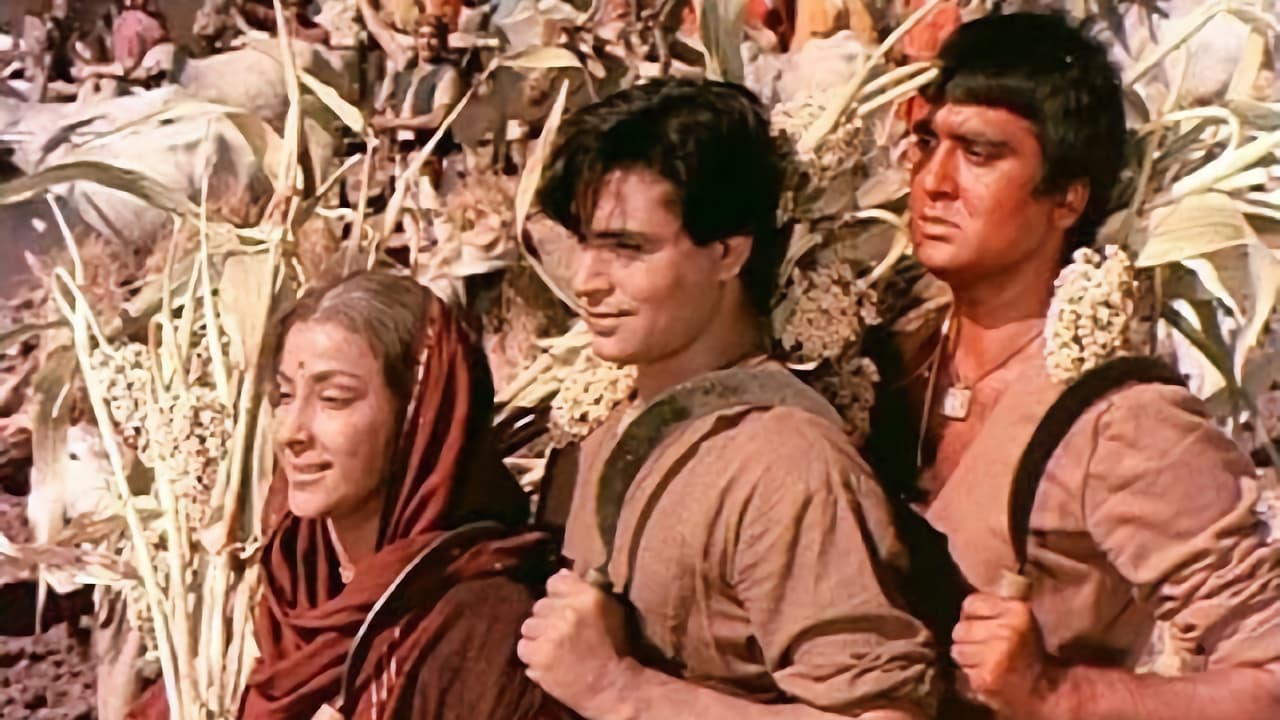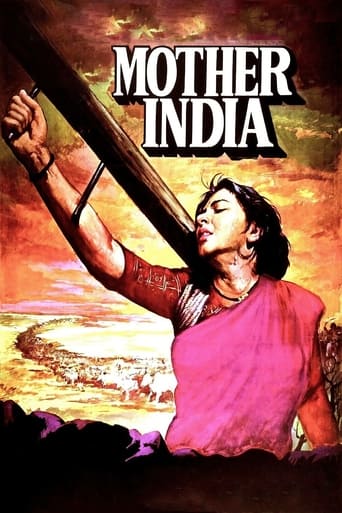FuzzyTagz
If the ambition is to provide two hours of instantly forgettable, popcorn-munching escapism, it succeeds.
Casey Duggan
It’s sentimental, ridiculously long and only occasionally funny
Sarita Rafferty
There are moments that feel comical, some horrific, and some downright inspiring but the tonal shifts hardly matter as the end results come to a film that's perfect for this time.
Spondonman
One of the pinnacles of world cinema, after all these years Mother India still has the power to put you through an emotional mangle showing the relentless battle against poverty of all kinds. But if Nargis hadn't been the star what then? It was her performance in here that was so spellbinding, usually sublime occasionally melodramatic but always riveting. I don't think anyone else could have made Mehboob's expert quasi-Soviet propagandising so palatable either. It was a seminal film, a nowhere near perfect roller-coaster that emotionally engages the viewer immediately to the bittersweet end.In flashback the story is family take a loan from a moneylender to pay for a wedding and stay in debt for decades simply repaying the interest and not even touching the principal. The literally grinding poverty is passed down to the children who do their best but gradually question the original deal. As the good times and the tragedies go by it's all performed in a glorious colour, with some glorious photography full of national or emotional symbolism and some seemingly effortless glorious songs from Naushad & Badayuni. Although before tonight I last saw it decades ago it still looked good in black & white. Even if it's Nargis's film there's still some fine acting from Raaj Kumar (whether living or from the beyond), Rajendra Kumar and the manic Sunil Dutt.As the point behind the film is not entirely lost on me in that the bitterness of the hopeless past was to be replaced with the optimism of the future India, proud of its tradition but full of the vim needed to be a world power may I sorrowfully point out: British rule certainly did the Indian peasant no favours, but the Indian capitalist class simply continues with that policy against worker and peasant alike. Godless Profit will destroy Tradition every time; also going to Mars means more to the present Indian government than feeding the starving. Mehboob preferred indigenous usurers and parasites taking apparent control of their collective destiny; I'd be interested in seeing his 1940 film Aurat which supposedly was the original of Mother India, made when it was still British India. "If Life is poison we must drink it" Lata sings as admonition to the peasants to work till they drop and are finally happy - but Life is seldom poison to the carefree few who own the land and means of production. And many iconic images and framings reinforce the view that we're all in it together even when as ever we're not. On the other hand when Nargis later became a politician she was right to criticise the film director Satyajit Ray and his muddy Pather Panchali as one-sided – there not only has to be an invisible Sun, there always is – love, hope and health are also there together with blood, sweat and tears.At 130 minutes in when Nargis says "Won't you come to see your grandson?" it's just about the last tearjerking straw, an unparallelled poignant moment out of so much in here that's memorable for one reason or another. Personally that one astounding line is worth the waiting for. The whole epic doesn't seem too long to me (and Bir Ju's story in full could've added hours to it), but beauty is in the eyes – and ears – of the beholder; a wonderful tale, keep right on to the end of the road.
adztigana
It was midnight couple of weeks back, and Mother's Day mode was in the air. Turmed on the TV and the movie was about to start. Astonishingly myself not a core Hindi movie follower glued in front of the TV way until 3.30am that night/morning. The reason was the superb performance by Nargis in the movie. Possibly a magnificent portrayal by an actress in a movie, Nargis pulled a character not withholding the burden, humiliation and suffering she endured - just because of her love for her sons. And the ending in such heart hammering way, perfectly crowning the character Mother India. The movie is one of those poured the heart and soul of a mother despite shortcomings. And to think I watched it on my first Mother's Day without my own late beloved mum. There is no me or us, without our own mother.
Gaurav Srivastava
This is perhaps one of the best if not the best Indian Movie ever made. A strong story line depicting the values and tribulations of rural India,this movie is backed up by some very powerful performances.All from Nargis,Suniel Dutt,Rajendra Kumar to Kanahiya lal are superb. The story revolves around Nargis and shows the trials and tribulations of her life. There are quite a few memorable sequences in the film. Starting from the scene when Nargis's one child has died due to malnutrition and the other two live ones are extremely hungry. In the moment of extreme despair when she decides to go to the village Baniya,her facial expression showing a mixture of pure contempt and extreme dejection are superb. A word must be said about the director of the movie,Mehboob Khan,right through out the movie one can see,his vision and creativity shining brightly. Every scene it seems has been hand crafted and all the sequences are closely linked to each other. The music too of the film is immensely pleasing to the ears. The songs give the aroma of the richness of the Indian village and are a treat to watch too. Above all the movie is about hope and values. Such a vivid interplay of emotions which are very close to the native Indian sensibilities is hardly ever seen in Indian cinema.The title is apt too surely this is the MOTHER India of all Indian films!
Umar Mansoor Bajwa
Mehboob Khan's Mother India reserves a special place among all time great and memorable Mega Hit films. Nargis has consummately performed a versatile role of a mature Indian mother who would not allow her own son to rob the honor of their village at any cost. The climactic last scene of the epic, where Radha shoots her son in the back, while Birju was all set to kidnap the cruel money lender's daughter is a tragedy sequence that can be commensurately compared with the ending of another emotionally charged film - Shakti, where Dilip Kumar shoots in the back of his son "Amitabh".However, Birju's angry performance in this movie steals the show at many a times; for instance, when he argues with his mother and brother about the greedy Bania moneylender who had fleeced their family from all earthly possessions through the odiously manipulative annual interest rate charged by him, although they have toiled day and night to return the debt.It is a great melodramatic picture, containing magnificent performance by Nargis and Sunil Dutt, while manifesting the impoverished economic conditions and abysmal living standards of a typical Indian rural family who were driven in utter disgust, shame and tragedy due to the volatile temper of one of their family members. However, seething poverty was not the sole reason which perturbed Birju (Sunil Dutt) to become an outlaw and murder Sukhi Lala (the rapacious money lender), but the very ominous and cruel person hidden in the money lender, who, in a backward rural social setup took full benefit/advantage of the poor, illiterate and weak elements of village social order.Besides, the strong and moving story line, Faredoon has captured mesmerizing stills providing an excellent background setting of the full horizon picture down to the ground level with spreading murky clouds at dusk against the backdrop of silhouetted actors.It is definitely a must see movie having marvelous and stupendous cinematography, as well.

